A ten-part television series from Iceland. Nordic noir without the computer graphic images of gratuitous gruesome gore that typify far too much of the genre. IMDB rates it at 8.2.
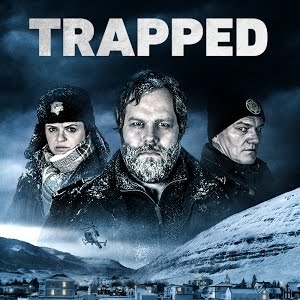
It kept us coming back for more. Each fifty-minute episode ending on some crisis, and each subsequent episode beginning with a recapitulation. Slow and old fashioned.
What’s to like?
The pace is measured and low key. No shouting, table banging, or the other crutches mentally impoverished screen writers and directors use to distract from the superficiality of the work.
The setting is great travelogue. Snow, mountains, and fjords, oh, and plenty of ice on the north coast of Iceland.
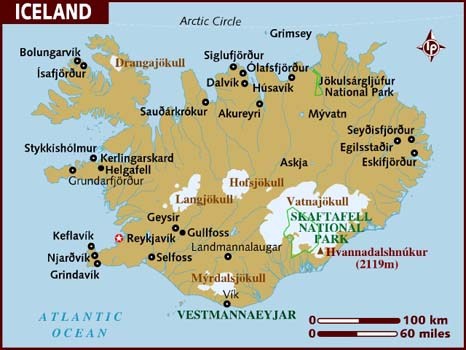
The Iceland’s weather is a major character that directs and limits what the human agents can do.
The interaction of the public and private lives of the characters in the small town which is cut-off by a storm.
The three small town cops, each different, make a good team, fallible though each is.
The crippled watcher. But we got too little of him.
The several wheels within wheels which were neatly wrapped up in the end.
The redemption of the falsely accused and imprisoned boyfriend.
‘The devil entered me’ said the grieving grandfather.
That most of the trouble was all homegrown and did not come on the ferry.
The mixture of languages, Icelandic, Danish, German, French, and English.
The cannibalistic media. Another tired trope but I am not yet tired of it.
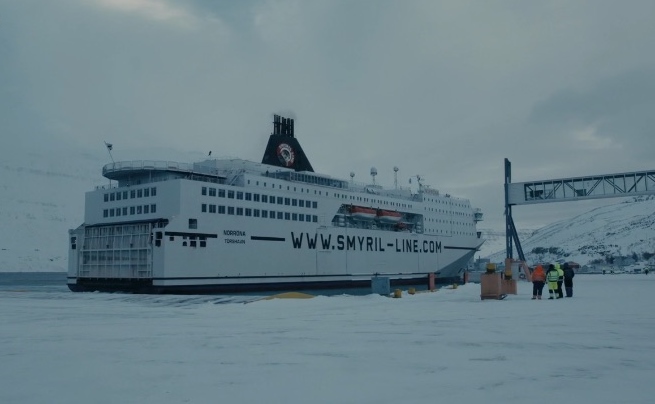
What’s not to like?
The big city cops are a trope, arrogant, easily satisfied, and incompetent.
The ex-wife’s boyfriend is ever present, leading to the conclusion that he will figure in the plot, but he does not. A blue herring.
The ferry captain’s change of heart was pat.
The police commissioner in Reykjavik was built up to be important in the story and then dropped.
Andri’s backstory was a boring distraction as they always are. This is another crutch.
We found it on SBS On-Demand. Hooray!

But we found it very difficult to find on the telly. The TV screen search function could not find itself! Nor could it find ‘Trapped.’
The iPad app is great. It was easy to find ‘Trapped’ on it but we wanted to watch it on the big screen in front of the easy chairs. The app does not communicate with the television as far as we could see.
Month: July 2016
Heathrow- never again.
Heathrow is the worst airport I have had to go through and I have a taken a vow to myself never to do so again. To go to Dublin a couple of years ago we went through Amsterdam instead. I said that recently and was challenged with a barrage of stories about other airports.
Gosh, we travellers are picky.
I stopped to think about my experiences at Heathrow, good and bad. Good is a shorter and less intensely-felt list so I will do it first. I include everything from cab drivers to the elevators because it is all part of the Heathrow experience, n’est pas?
The good.
I had a few painless check-ins that I can no longer remember. The more so since some of my passages were on business class tickets.
When it came at long last, the train to Paddington was wonderful. It reduced the pain from the distant airport a lot and it offered the first British train station I had ever seen that was not filthy.
Once when I was particularly discombobulated, turning left instead of right, I lined up in the wrong place at United, and was treated like a king. I expected to be sent back around the corner to the right place but instead I was checked in with a happy smile. The line I hit by mistake was one reserved for VIPs, a category that has never included me.
In 2004 we rented an Avis car for drive around and that was smooth, and while finding the car in a distant lot we watched a Concorde take-off: loud and burning a lot of oil. The Avis agent gave a few personal tips on petrol that we used.
Here is the best, once very early one morning in 1994 while waiting for a flight I saw a sign at 8 a.m. offering free tastings of Chateau d’Yquem at a bottle shop in the terminal. Yquem is worth lining up for any where and any time. So I lined up outside the door to wait for 8 a.m. to arrive, and it did, and I did taste five vintages of this nectar of the gods. I knew that Baron Rothschild used to drink half a glass at breakfast over ice instead of orange juice; I knew that locals genuflected as they passed the vineyard. Now I knew why. It was part of a sale of the stock from a very high-end restaurant that had gone into bankruptcy and the stock had to be sold by the end of the month.

I bought a bottle for about a £150 and carefully carried it back to Sydney. That was a lot of Australian dollars worth of pounds.

A dinner party was arranged and at the end of the banquet, the Yquem was produced and knocked us speechless. I genuflected. We still keep the now empty bottle in a place of honour. Well, in the garage but I found it and the original docket — stored within — as above.
I learned a trick to cook an egg over bread in a microwave once when we ate at a cafe in a terminal. We still refer to that as a Heathrow egg.
The Bad
 Ironic.
Ironic.
Taking the Tube to Russell Square, while a struggle, was convenient and I did that many times because of the British Library. Happily the lifts and escalators worked there. Once out of the station I had to walk with the bags to the hotel, or if the bags were too much, then haggle with a taxi driver for a short ride around the Square, and that seemed to get more difficult each time I tried it. Sometimes a double fare was not enough to get the bags and me around the square to the hotel.
The worst single event was one morning waiting in line outside at an airport hotel for hours for the airport bus to arrive. I had gone to that hotel the night before for an early morning flight. There came no bus and no information as more and more travellers emerged from the hotel to join the queue. The line of patient waiters grew longer and less patient. No mobile phones then. That was the day the parking garage fell down. There was never any information but cab drivers bringing people from the airport spread the word and packed us up for the terminals. My Air France flight was delayed, cancelled, etc. Instead of arriving in Florence at 10 am to find my hotel in broad daylight, I arrived at 10 pm and it took some time since I was driving a rental car in the dark in an unfamiliar environment per Italian rules of the road.
In a logic that neither Mr Spock nor I understand, the left luggage office at a Heathrow terminal was on an upper floor. Cheaper floor space, I suppose. Leaving and later collecting luggage meant getting it to that floor. On one trip the lift to that office was out of order both when I left the luggage and later when I went to collect it, so it had to be man(me)handled up and later down the stairs. No explanation, no apology, no discount on the fee for the extra trouble. Just the usual snarl when I mentioned this fact to the attendant who had no doubt heard it all before, and it bounced off.
The most typical experience: to exit the aircraft and to walk through one corridor after another pulling the reluctant carry-on bag over layers of wrinkled and sagging carpet that velcros the wheels. I timed such a walk once and remember it to be 25 minutes through dim and dank corridors.
Then came, as always, the wait in line for the immigration stamp. Yes, I have timed that, too, and hit 45 minutes once. When at last I got to the officer, he was polite, pleasant, brisk, and efficient and the whole transaction lasted less than 30 seconds.
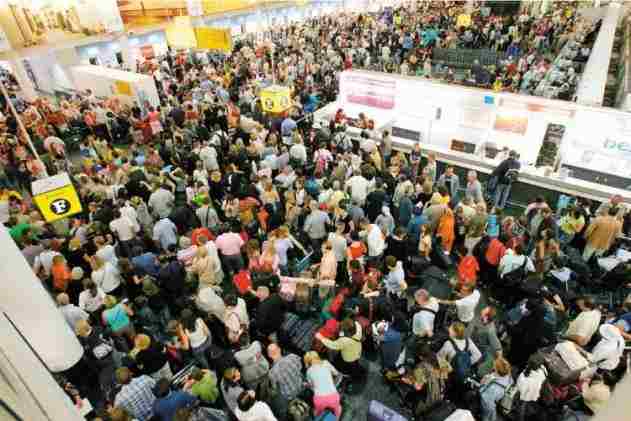 On a bad day.
On a bad day.
When departing once, I disembarked from the bus between terminals at the door to find a queue out of the building. There was no attempt to manage or organise the line. It was raining, as always. and I was not dressed for it since I had assumed I would not be out in the weather. Was this the line to be in? I did not know but I could not otherwise get into the building so I waited, and in the end by some miracle it was the BA check-in, and once I got to the front it was quick, pleasant, and done. But it was an anxious wait, for if I was in the wrong line, by the time I realised it, it would be too later to find the right line for the trans-oceanic flight.
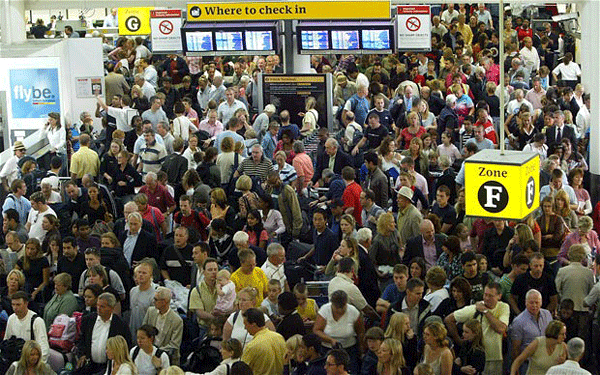 On a good day.
On a good day.
My briefcase split and spilled in the rain once going to a rental car. Well, it was a bad experience and it happened at Heathrow, so it is included. (It was the Japanese one that never seemed to hold anything, though it was heavy and large, there never seemed to be any room inside; it came full of lining, padding, inside pockets all of which precluded putting anything else in it.)
We stayed once in an airport Thistle Hotel at Heathrow. It may be the worst hotel I ever experienced. Faulty Towers would have been an improvement. Nothing brisk, efficient, or pleasant about it. There was no line but check-in seemed like a canto from Dante’s ‘Inferno.’ Getting the bags to the room, over lumps in the floor, sagging carpets, fire doors off the hinges… Communicating with the staff, well, it proved impossible. I say ‘may’ be the worst because we once stayed in a Thistle in London…
One taxi driver, having studied a year and a half for the license, took me to the wrong airport hotel. It was late and I was exhausted from a long flight, and in any event I did not know where the hotel was. There was no definitional argument here. The driver, when we pulled into the drive way, admitted this was the wrong hotel, not the one I had ever so slowly and clearly stated and he promptly turned off the meter and turned around and took me miles to the right hotel on the other side of the airport.
Once I opted for the Heathrow bus from Russell Square at 5 a.m. The pick up in the damp winter darkness at 5 a.m. was on time and that was the last time. Traffic gridlock started at the next intersection and it took hours to get there. I had allowed four hours and just barely made it.
This was the occasion, standing under the Heathrow bus sign waiting patiently, when a taxi driver pulled up and told me the bus was slow, uncomfortable, and he would gladly drive me to Heathrow and even reduce the fare. I said no thanks. He persisted, and I mean persisted. He mentioned prices and I kept saying ‘No, thank you.’ [Keep reading, the punch line is coming.] Finally, he had got himself worked up and said ‘Well what would you pay?’ and I said ‘Five pounds [which was the bus fare]’ and he exploded. Five pounds! I was a crook, a crazy man, and typical foreigner robbing the working man…. and off he went shaking his fist at me. What a home life he must have.
The bus was an improvement, apart from the time, over the Tube. Taking luggage on the Tube to and from Heathrow was… a great convenience and a major hassle. The more so in peak hour and when, pray tell, is not peak hour not the Tube.
Any reader who gets this far is invited to compose a line or two of their own experiences.
‘The Ivory Grin’ (1952) by Ross Macdonald
A gritty tale of unrequited love(s), madness, and sacrifice from the stylist of noir krimis. Raymond Chandler had a ear for dialogue, while Ross Macdonald has a jeweller’s eye for descriptive metaphors and images. Lewis Archer is his avatar.
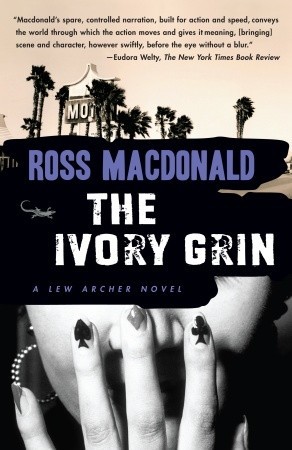
While the novels obey all the conventions of the genre in its time and place, it also turns them inside out. The PI’s boredom counting flies on his office windrow is interrupted by a femine fatale, as required, but this one, despite the diamonds and furs is barely a femme at all. A very mannish woman is she. Archer’s emphasis on her lack of feminine qualities is partly the everyday sexism of the era but it also turns out to be a pivot in the plot.
As always with Macdonald, everything from the color of the sunset to the hats impart texture, reveal character, and unwind the plot. Nothing is ever wasted in his novels.
This is a triangle of three families, locked together by one of the offspring. Bess is literal when she says she loved him to death. Lucy, the loyal nurse, sees more than she ought and cannot get out of the vortex. That manly woman is normal compared to her brother, who has a gun. Assorted other lowlifes pass by, but the worst of the lot is the quiet suburban doctor.
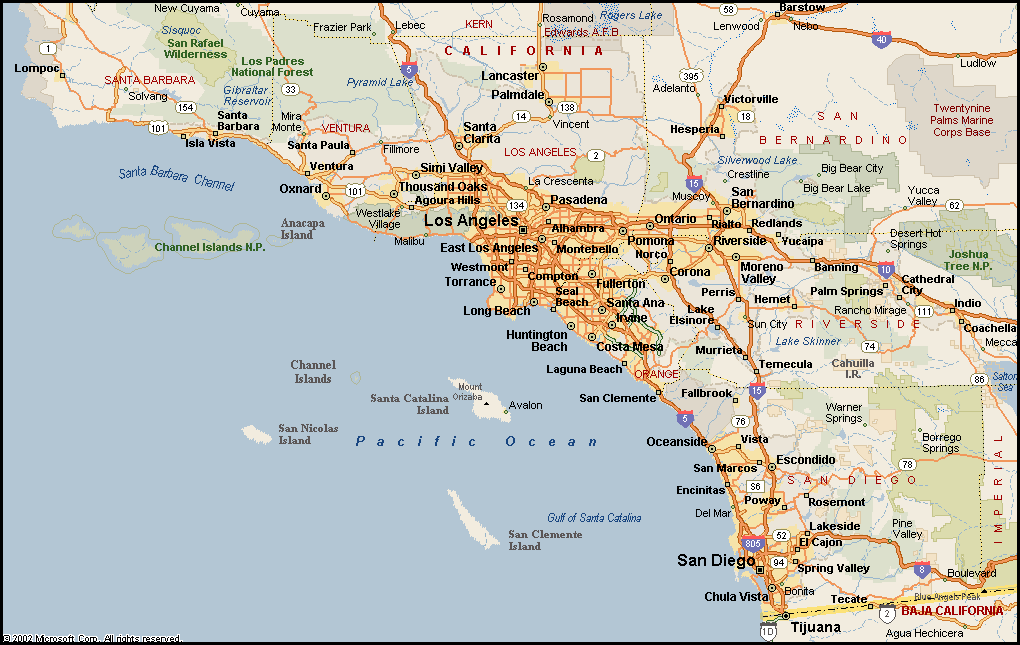 Archer country
Archer country
There are some innocent bystanders along the way, Alex the love-sick boy who pines for nurse Lucy and the love-sick girl Sylvia, who pines for playboy Carl, and who becomes in a convolution of the plot Archer’s client.
I still have the paperback copy of this I read In the 1970s but I re-read it on the Kindle. I turned to it to find something to read after a series of misfires with annoying, self-indulgent, padded, and pointless krimis. If only Jane Austen knew what she had spawned when she told would-be writers to to write about what they know. Far too many only know the IKEA catalogue. Why continue the search for quality when I know right where it is.
Sometimes Macdonald’s metaphors and images come so thick and fast that they create a traffic jam in the reader. Sometimes the psychologizing gets in the way of the momentum of the story. But these are the prices of admission.
Archer is named for Sam Spade’s deceased partner, Miles Archer, who believed in fifty dollar bills.
Macdonald’s krimis are hard boiled in that they are unsparing In word and deed. The villains are villainous with little of no veneer. Often the mystery is less who dun it than why dun it. That is the psychological depth that distinguish his works.
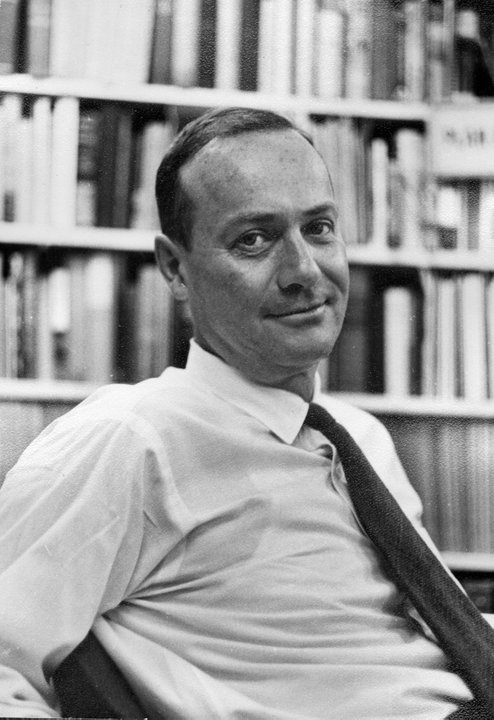 Ross Macdonald, who spelled his name with a lower case ‘d’ though the spellchecker disagrees.
Ross Macdonald, who spelled his name with a lower case ‘d’ though the spellchecker disagrees.
This one is the fourth of eighteen Archer novels over a thirty year period.
At least one of his krimis had a rave review on the front page of the ‘New York Times.’ The book was ‘The Underground Man’ in 1971 and the reviewer was that southern novelist of note Eudora Welty.
Yet none of his novels was ever awarded a paramount krimi prize like the Edgar. Figure that out, Mortimer.
Had I to pick one, it would be ‘The Blue Hammer’ in 1976, his last completed novel. I recall still how eager I was to get it and to read it, taking it with me when I went jogging to read a few pages while catching my breadth.
A mature work. in it he is not trying so hard to crowd in metaphors and there is less speculative psychologizing by Archer, while retaining the descriptive richness, the psychological depth, the ambiguity of motivations, and the equilibrium of the moral balance. In his books, unlike life, the world bends towards justice of a kind.
Perhaps Macdonald wrote one book eighteen times, as has been said, the same story of twisted love, divided loyalties, wayward offspring, mental imbalance, irresponsible parents, each magnified by a the glare of money in the prism of California sunshine that blinded the individuals to their own deeds.
By volume eighteen the biggest mystery is Lewis Archer himself about whom the reader learns almost nothing. He is a lens that reveals the story of those around him. By his actions we can see he is an inveterate loner, but one who warms readily to some women he meets for their physical and intellectual charms and vulnerability; he is dogged, and hard working. He wears a hat which he sometimes takes off. In one story we note he drives a light blue car, in contrast to his dark blue mood. At least he has a name, unlike Dashiell Hammett’s Continental Op.
There is less about Archer in the eighteen titles than there is about Philip Marlowe in one of Chandler’s books. Archer has no backstory. The reader is not manipulated into feeling sorry for him. Why should I, he certainly does not feel sorry for himself.
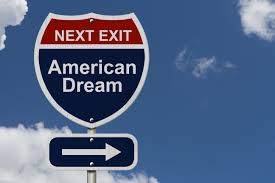
Archer reports on the dirt under the carpet of the American Dream in the golden sunshine of Southern California, and it is very dirty. Yet he meets honest people whom he likes, and some he even admires. Say in contrast to the BBC’s Christopher Foyle whose world is populated entirely by liars, cheats, and murderers, often dressed in gold braid with aristocratic titles and important government jobs, Foyle’s is a world without hope, but Archer’s world has hope, and that is what keeps him going.
‘The Adventures of Tom Stranger, Inter-dimensional Insurance Agent’ (2016) by Larry Correia.
The title alone was irresistible, and my resistance is futile, quite often.

It opens with the destruction of Earth and then it gets worse!
Fortunately, Earth had an All-Catastrophe policy, no exemptions and no deductible, with Stranger and Stranger Insurance, and Tom Stranger appeared in time to put things right, dragging in his wake one very reluctant intern. (President John Wayne took out the policy and arranged for eternal payment of the premiums.)
Tom offers the best customer service in the universe, and he means that literally. Anything less than a ten our of ten is failure, and Tom does not fail, not even when confronted with dinosaurs sporting Nazi insignia. (Part of a Trump delegation.)
The intern thought a six-month stint in insurance would be, like you know, easy. As a Gender Studies major he had not actually bothered to read any of the print, fine or actually otherwise, but, like, was waiting for the movie, actually, like, so he had no idea, like, actually what he had signed on for actually. Well ‘no idea’ might be a generalisation. ’Thought’ is not the right word. No thinking occurred. The intern is a thought-free zone.
Moreover, this Gender Studies intern was from…yes, it gets worse, Chico State, where beer stains on tee-shirts are, well, like, cool, way cool actually.
Tom would like to return his intern from whence he came, but duty calls and redeeming a Gender Studies major from Chico State, now that would be a challenge of inter-dimensional magnitude.
But first, Tom and the intern find themselves in Nebraska where they must battle the ultimate evil. Gulp!
Tom is rated at 104.3 Bear Grylls while the intern is a puny, 0.4 BG. The Bear Grylls rating refers to what it would take to kill BG. It is an inter-dimensional standard. [Love it!] Tom can man-up, or rather Bear-up, to the ultimate evil there among the corn fields, but he will have to shelter that puny intern who is less than half a Bear Grylls.
 Larry Correia
Larry Correia
NO SPOILER.
It is two hours of spoof, like a long skit from SNL in its heyday, read by Adam Baldwin who manages all the inter-dimensional voices, including Muffie back head office. Discerning readers may remember Adam Baldwin as Animal in ‘Full Metal Jacket.’ It is high octane all the way.
The corporate speak, the obsession with the customer experience ratings while ignoring customers, the constitutional inability of an insurance company to pay a claim, the CVs of the policy-holding political leaders encountered along the way, the numb brain of the intern, all of it rings true. How can this be fiction in a world where Donald Trump is reality? Go figure that out.
It has been a while since I used Audible so I had another look and found this corker. I listened to it while pumping iron and pushing pedals at the gym. I call it a krimi because there are plenty of crimes, but in a boring old book store it would be sci-fi.
